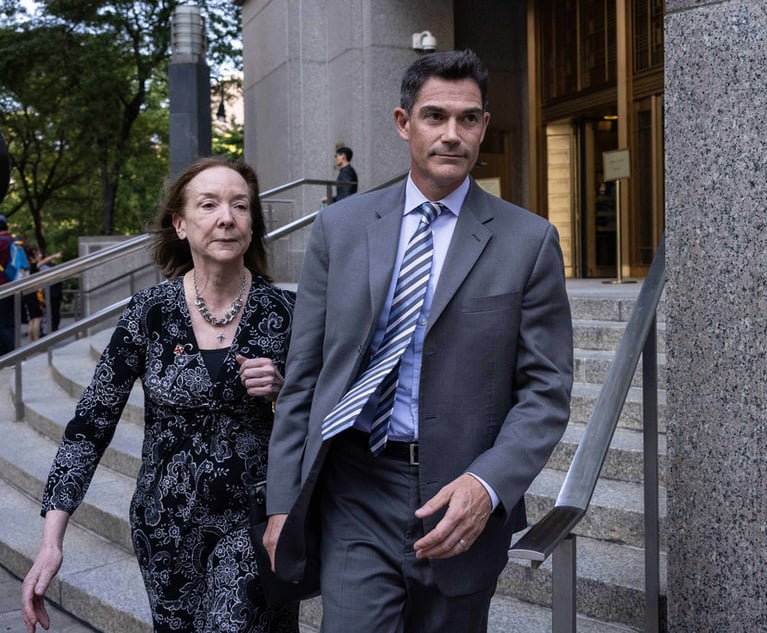The Muddy Waters of Insider Trading Law Just Got Muddier
The procedural posture of 'Blaszczak' adds new cracks to the already unstable foundation of insider trading precedent.
February 08, 2023 at 11:00 AM
11 minute read
 In December 2022 in United States v. Blaszczak, 56 F.4th 230 (2d Cir. 2022) (Blaszczak II) a Second Circuit panel issued a ruling vacating the court's controversial three-year-old decision in United States v. Blaszczak, 947 F.3d 19 (2d Cir. 2019) (Blaszczak I). In Blaszczak I the Second Circuit held that a government agency's confidential information can constitute "property" for purposes of federal criminal fraud statutes and that the "personal benefit" test announced by the Supreme Court for insider trading cases under Section 10(b) of the Securities Exchange Act does not apply to insider trading cases charged under the securities fraud provision in Title 18 (18 U.S.C. §1348). Illustrating the ever-shifting sands at the foundation of insider trading law, while defendants' certiorari petitions were pending in Blaszczak I, the Supreme Court issued Kelly v. United States, 140 S. Ct. 1565 (2020), and as predicted, the Supreme Court vacated the decision in Blaszczak I and remanded the case to a different panel of Second Circuit Judges—Judge John Walker replaced Judge Christopher Droney who retired days after issuance of the original opinion—for further consideration. See Robert J. Anello and Richard F. Albert, Days Seem Numbered for Circuit's Controversial Insider Trading Decision, NYLJ (Dec. 10, 2020).
In December 2022 in United States v. Blaszczak, 56 F.4th 230 (2d Cir. 2022) (Blaszczak II) a Second Circuit panel issued a ruling vacating the court's controversial three-year-old decision in United States v. Blaszczak, 947 F.3d 19 (2d Cir. 2019) (Blaszczak I). In Blaszczak I the Second Circuit held that a government agency's confidential information can constitute "property" for purposes of federal criminal fraud statutes and that the "personal benefit" test announced by the Supreme Court for insider trading cases under Section 10(b) of the Securities Exchange Act does not apply to insider trading cases charged under the securities fraud provision in Title 18 (18 U.S.C. §1348). Illustrating the ever-shifting sands at the foundation of insider trading law, while defendants' certiorari petitions were pending in Blaszczak I, the Supreme Court issued Kelly v. United States, 140 S. Ct. 1565 (2020), and as predicted, the Supreme Court vacated the decision in Blaszczak I and remanded the case to a different panel of Second Circuit Judges—Judge John Walker replaced Judge Christopher Droney who retired days after issuance of the original opinion—for further consideration. See Robert J. Anello and Richard F. Albert, Days Seem Numbered for Circuit's Controversial Insider Trading Decision, NYLJ (Dec. 10, 2020).
On remand, in a familiar turn of events, Judge Amalya Kearse, writing for the majority, vacated defendants' convictions on the very ground of her dissent in Blaszczak I, leaving intact Blaszczak I's conclusion that Section 1348 does not require proof of personal benefit. A forceful concurrence by Judge Walker, joined by Judge Kearse, calls into question this second holding and cautions of the dire consequences for legitimate market activity. In recognition of the persistent doctrinal flux, Judge Walker calls on Congress and the courts to require the government to demonstrate proof of a personal benefit to secure a Section 1348 conviction. Given the procedural posture of the Blaszczak case and the lack of judicial precedent in other circuits, Judge Walker's insights add more mud to the already muddy waters of insider trading law in the Second Circuit and elsewhere.
The Friends With Benefits Requirement of Insider Trading Liability
The sense of whiplash that some may feel after the Blaszczak opinions is not a new phenomenon in insider trading law. Instead, the decision builds on the already unsteady foundation of a confusing array of cases. In the seminal decision Dirks v. SEC, 463 U.S. 646 (1983), the Supreme Court, drawing on the purpose of the Exchange Act, held that liability for insider trading requires proof that an individual—the "tipper"—disclosed material, nonpublic information in exchange for a "personal benefit." "[T]he test is whether the insider personally will benefit, directly or indirectly from his disclosure." The Court explained that what makes insider trading deceptive, and thus fraudulent, is a breach of a duty of trust and confidence to the source of information through use of the information for a "personal benefit." A recipient of insider information—a "tippee"—also can be liable for securities fraud where he or she, knowing that the inside information was disclosed in violation of the insider's duty, then trades based on that information. Since Dirks, the Second Circuit has attempted to clarify the scope of this test, in a back-and-forth dialogue with the Supreme Court that has led it to revise and circumscribe prior opinions. See, e.g., United States v. Newman, 773 F.3d 438, 447-49 (2d Cir. 2014), abrogated by Salman v. United States, 137 S. Ct. 420 (2016); United States v. Martoma, 869 F.3d 58 (2d Cir. 2017) rev'd, 894 F.3d 64 (2d Cir. 2018).
This content has been archived. It is available through our partners, LexisNexis® and Bloomberg Law.
To view this content, please continue to their sites.
Not a Lexis Subscriber?
Subscribe Now
Not a Bloomberg Law Subscriber?
Subscribe Now
NOT FOR REPRINT
© 2025 ALM Global, LLC, All Rights Reserved. Request academic re-use from www.copyright.com. All other uses, submit a request to [email protected]. For more information visit Asset & Logo Licensing.
You Might Like
View All
'You Became a Corrupt Politician': Judge Gives Prison Time to Former Sen. Robert Menendez for Corruption Conviction
5 minute read

Menendez Asks US Judge for Bond Pending Appeal of Criminal Conviction

Jona Rechnitz Sentencing in Federal Court Is Postponed to June
Law Firms Mentioned
Trending Stories
- 1Uber Files RICO Suit Against Plaintiff-Side Firms Alleging Fraudulent Injury Claims
- 2The Law Firm Disrupted: Scrutinizing the Elephant More Than the Mouse
- 3Inherent Diminished Value Damages Unavailable to 3rd-Party Claimants, Court Says
- 4Pa. Defense Firm Sued by Client Over Ex-Eagles Player's $43.5M Med Mal Win
- 5Losses Mount at Morris Manning, but Departing Ex-Chair Stays Bullish About His Old Firm's Future
Who Got The Work
J. Brugh Lower of Gibbons has entered an appearance for industrial equipment supplier Devco Corporation in a pending trademark infringement lawsuit. The suit, accusing the defendant of selling knock-off Graco products, was filed Dec. 18 in New Jersey District Court by Rivkin Radler on behalf of Graco Inc. and Graco Minnesota. The case, assigned to U.S. District Judge Zahid N. Quraishi, is 3:24-cv-11294, Graco Inc. et al v. Devco Corporation.
Who Got The Work
Rebecca Maller-Stein and Kent A. Yalowitz of Arnold & Porter Kaye Scholer have entered their appearances for Hanaco Venture Capital and its executives, Lior Prosor and David Frankel, in a pending securities lawsuit. The action, filed on Dec. 24 in New York Southern District Court by Zell, Aron & Co. on behalf of Goldeneye Advisors, accuses the defendants of negligently and fraudulently managing the plaintiff's $1 million investment. The case, assigned to U.S. District Judge Vernon S. Broderick, is 1:24-cv-09918, Goldeneye Advisors, LLC v. Hanaco Venture Capital, Ltd. et al.
Who Got The Work
Attorneys from A&O Shearman has stepped in as defense counsel for Toronto-Dominion Bank and other defendants in a pending securities class action. The suit, filed Dec. 11 in New York Southern District Court by Bleichmar Fonti & Auld, accuses the defendants of concealing the bank's 'pervasive' deficiencies in regards to its compliance with the Bank Secrecy Act and the quality of its anti-money laundering controls. The case, assigned to U.S. District Judge Arun Subramanian, is 1:24-cv-09445, Gonzalez v. The Toronto-Dominion Bank et al.
Who Got The Work
Crown Castle International, a Pennsylvania company providing shared communications infrastructure, has turned to Luke D. Wolf of Gordon Rees Scully Mansukhani to fend off a pending breach-of-contract lawsuit. The court action, filed Nov. 25 in Michigan Eastern District Court by Hooper Hathaway PC on behalf of The Town Residences LLC, accuses Crown Castle of failing to transfer approximately $30,000 in utility payments from T-Mobile in breach of a roof-top lease and assignment agreement. The case, assigned to U.S. District Judge Susan K. Declercq, is 2:24-cv-13131, The Town Residences LLC v. T-Mobile US, Inc. et al.
Who Got The Work
Wilfred P. Coronato and Daniel M. Schwartz of McCarter & English have stepped in as defense counsel to Electrolux Home Products Inc. in a pending product liability lawsuit. The court action, filed Nov. 26 in New York Eastern District Court by Poulos Lopiccolo PC and Nagel Rice LLP on behalf of David Stern, alleges that the defendant's refrigerators’ drawers and shelving repeatedly break and fall apart within months after purchase. The case, assigned to U.S. District Judge Joan M. Azrack, is 2:24-cv-08204, Stern v. Electrolux Home Products, Inc.
Featured Firms
Law Offices of Gary Martin Hays & Associates, P.C.
(470) 294-1674
Law Offices of Mark E. Salomone
(857) 444-6468
Smith & Hassler
(713) 739-1250






